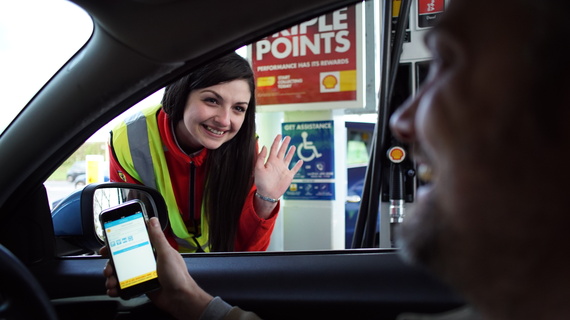
If you aren’t disabled then you’ll probably never realise how difficult a simple thing like filling up your car can be. I know that I never gave it a second thought before I had a bike accident in 2013, which left me paralysed from the chest down. After spending five months recovering in a spinal unit, where I was taught how to drive a car again using hand controls, I was looking forward to regaining my freedom. That is until I took my first solo drive.
Imagine for a moment what it is like trying to refuel without the use of your legs? I am lucky I can use my arms, but I still have to lift my chair over myself from the passenger side and haul myself into it, which can take five or 10 minutes in itself. I have poor balance, so I invariably end up dousing myself in petrol as I fill up, and then there’s the whole process of getting myself and my chair back into the car again, covering myself in all the dirt and petrol its wheels have picked up in the process. All told, this can take as long as half an hour.
There are an estimated two million disabled drivers in the UK, so I am far from the first one to experience these frustrations, and things are far worse for people without even my level of mobility. If you can’t get out of your car then you simply have to drive from station to station trying to find one where the staff can help you, hoping that you don’t run out of petrol before you get there.
Once you arrive there is no guarantee that staff will notice you and come to your aid. You can only hope for the best as you flash your lights, beep the horn or wave your Blue Badge around, but that’s humiliating, particularly as other drivers have no idea you’re disabled and just see you acting like a crazy person at the pump.
Given that disabled people are even more dependent on their cars than most, these frustrations are a serious issue, and one that I decided use my IT expertise to solve. After spending over a decade working for Cisco I understood that to create a really successful product you have to devise a simple solution that works seamlessly to fix a problem for both the end user and the businesses that have to implement it.
This was the inspiration for the fuelService app. It offers a two-step process to take all the uncertainty out of refuelling for disabled drivers. Step one is to help you locate the nearest petrol station where there is a staff member available to help you. Step two is to alert staff when you arrive, providing your pump number and allowing staff to tell you when they can come out to assist you. It’s that simple, yet it liberates disabled drivers from what has historically been a very painful process, turning refuelling into something that takes a few minutes, not half an hour.
So far the first fuel retailer to adopt the app is Shell, which has rolled it out in 822 stations around the UK. It has also integrated fuelService with its Fill-Up & Go app, which adds an online payment option in participating stations to make it as simple as possible for disabled drivers. The partnership with Shell is a great starting point, but with 6.9 million disabled people in the UK, catering for their needs is not only the right thing to do, but it also makes good business sense. The disabled community has been banging this drum for years and they are right. Disabled drivers depend on their cars so providing good facilities for them will add up to more sales.
My aim in creating fuelService, which was entirely self-funded, was to design an app that would help me and other disabled drivers overcome an everyday problem, but any profits I make will be used to help the disabled community even more. I have partnered with two charities, Spinal Research and Red Bull’s charity Wings of Life, and will donate proceeds to support them, but really my aim is to support anyone who is working to develop a cure for spinal injuries.
My life changing injury opened my eyes to how complex navigating the world can be when you’re disabled, but the silver lining is that this insight has inspired me to develop technology that makes one small, but crucial part of life easier for disabled drivers. Next stop is the cure that will make my app unnecessary.
— This feed and its contents are the property of The Huffington Post UK, and use is subject to our terms. It may be used for personal consumption, but may not be distributed on a website.